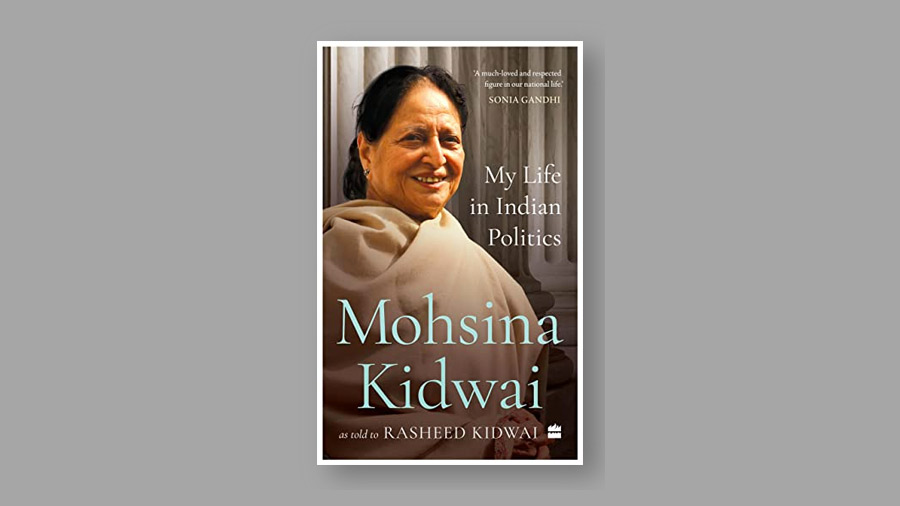When Mohsina Kidwai won her first election, Jawaharlal Nehru was the Indian Prime Minister. And till as recently as 2016, Kidwai was a member of Parliament, one of the only 20 Muslim women who have been elected to the Lok Sabha. The veteran Indian National Congress leader was a Union cabinet minister in several successive governments and had a ringside view of Indian politics from shortly after Independence.
Her memoir (as told to journalist and author Rasheed Kidwai), My Life in Indian Politics, published by Harper Collins India, is not only a candid account of her own public life but also an assessment of the entire era. The following excerpt from the book provides a behind-the-scenes peek at former Prime Minister Indira Gandhi, with whom Mohsina forged a relationship that survived two generations of the Nehru-Gandhi family.
Indiraji was extremely caring and attentive. I can go on talking about many instances. Sometime after the 1977 Lok Sabha polls, when Indiraji was in Opposition, she planned to visit Badrinath for puja. Narayan Dutt Tiwari and I accompanied her. It was October. We were told that puja starts from 4 a.m. Asking us to wait, she went to the temple for the puja. We were to start at 6 a.m. on the return journey to New Delhi. At 5 a.m., Indiraji returned from the temple and checked whether all the vehicles of our convoy were ready. The pundit of the temple offered us breakfast. When we were having breakfast, the drivers were heating the engines of their respective vehicles. I told Indiraji that while we had had breakfast, the poor drivers must be hungry. They had not even had tea as they were busy heating the vehicles’ engines. I suggested we stop at the first tea shop on our return for the drivers to have tea. She agreed.
Indiraji had the habit of carrying some snacks with her during travel, in a basket. After a while, I saw her taking out some biscuits from the basket kept beneath her seat. She broke the biscuits into four pieces and asked the driver to pick the pieces one by one from her hand while driving. She extended her hand carrying biscuit pieces and the driver did what he was told to do.
Indiraji used to enjoy such affection and the spontaneous display of it so much that it often stunned me and used to fill my heart with admiration and pride for my leader. Once, we were travelling to a famous Gurudwara in Haridwar, when her convoy was suddenly stopped by a group of Sikh devotees. She was in Opposition then and without much security arrangements. Indiraji got off to greet them. In a flash, a Sikh woman flashed her kripan and slit a part of her hand and quickly put a tilak of blood on Indiraji’s forehead saying, ‘Indiraji, aapki haar ka badla hum lenge’ (We shall seek revenge for your electoral defeat). This quick display of affection and respect mesmerized me and all those who were accompanying Indiraji then.
Indiraji could also sense what the people around her were feeling. Once, when we were travelling by an overnight train to Gorakhpur, I suddenly realized I was alone with the prime minister in the first-class coupe. She sensed that I was a little uncomfortable and directed me to turn my face towards the wall and go off to sleep.
I vividly recall another occasion when Indiraji visited Anandamayi Ma, the smiling saint, at her ashram in Kankhal (Haridwar). That was after Sanjayji had died and Indiraji was in emotional turmoil. From a distance, I could see Indiraji had placed her head on Anandamayi Ma’s lap and the saint was gently stroking her hair, trying to comfort a grieving mother.
Anandamayi Ma was a deeply spiritual soul who perhaps never advised anyone to become a renunciate. She would dismiss spiritual arguments and controversies by stating, ‘Everyone is right from his own standpoint.’ She also did not issue formal initiations and refused to be called a guru, as she maintained that ‘all paths are my paths’ and ‘I have no particular path’. She welcomed and conversed with devotees from different paths and religions—Shaivite, Vaishnavite, Tantric, Islam, Christianity, Judaism, Sikhism, Buddhism or Zoroastrianism. Every faith was welcome. Even now, Muslims of Kheora, Brahmanbaria District in present-day Bangladesh, refer to her as ‘our own Ma’.
Extracted with permission from
My Life in Indian Politics
by Mohsina Kidwai (as told to Rasheed Kidwai)
Price: Rs 699
Publisher: Harper Collins India











